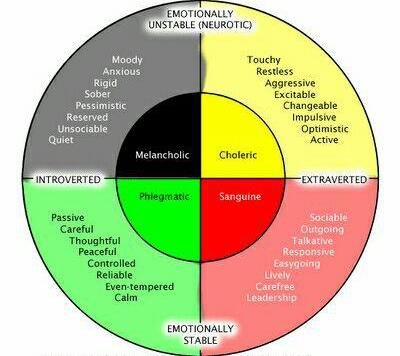4 Most Common Temperament Types
4 Most Common Temperament Types

By: Dylan Buckley
Source: ![]()
We absorb a lot of information as we grow up and encounter new surroundings, situations, and individuals. Each of these experiences has an impression on us that alters how we think and act, which is why our personalities are heavily derived from our journey through life. But are there parts of us based solely on biology?

Source: unsplash.com
What Is a Temperament?

A person's temperament is formed as an infant and never changes. It simply develops over time. Studies have shown that temperament remains constant and serves as a means to help you determine how you will react to situations. It's a way to recognize consistent personality traits.
One study indicated that temperament is determined by brain-stem processes. Each person has a unique brain stem that cannot change over the course of their life. More information will be provided about this as we look into the various temperaments you may hold.
Can Your Temperament Be Altered?
If you have a generally negative outlook, you have a lot of company. While your underlying temperament may be a permanent aspect of who you are, especially as you get older and continue building your experience based on how you see the world, you can certainly heal some of the ways that you feel and change your outlook on life. You're not going to be a whole other person but you can make sure that a better tomorrow is possible with the right tools and mindset.
The Four Types of Temperament
Psychologists recognize four primary temperament types. The names of the types were originally names of humor in more distant times. It was believed that humor caused people to behave in certain ways. Although science has refuted the existence of humor in that fashion, the names of the four temperament types stuck.
It is possible, in fact likely, that someone will have both primary and secondary temperament types. A person can have any combination of the temperament types to make up their overall personality. The four primary temperament types are explored below.
1. Sanguine
Sanguine is the most common temperament type. It is typically either a primary type or a secondary type, although, of course, not everyone is sanguine. This temperament type is just as likely to be found in men as it is in women. Some people are considered "super sanguine" in that they are so overly talkative and active that it can be overwhelming to be around them.
Sanguine Orientation
Those with the sanguine temperament type are extremely people oriented. They are outgoing and extroverted, and extremely talkative and social. They encourage people to work together and do good things for one another.
Sanguine Characteristics
People with the sanguine temperament type have a wide range of emotions, and also a wide range of behavior. They are the most versatile of all the temperaments. Depending on their secondary temperament, they might be involved in nearly any human activity. However, they enjoy occasions when they can interact with or change their environment.

Source: unsplash.com
Sanguine temperament people are playful and impulsive. They are constantly active and always optimistic. They have a good sense of humor, are entertaining and easily amused. They are also expressive and affectionate. They build relationships easily and are trusting of others.
Sanguine Traits
When you first meet someone with the sanguine temperament, you're likely to feel you've known them for a long time. They are comfortable to talk to and get to know. They are extremely friendly, talkative, and social. They will frequently get caught up in conversations and lose track of time. However, if they get bored, they can lose attention quickly. Their attention span is directly related to how much they are enjoying the conversation or what they are doing.
Sanguine temperaments are also highly emotive. If they think it or feel it, they will say it. They have no filter. Their hyperactivity often leads to forgetfulness and being disorganized. This temperament type is extremely competitive. They dominate sports, politics, and the business world. They also fear making a bad impression and rejection. They want most to be accepted but also to be the best they can.
2. Phlegmatic
Phlegmatic temperaments are also common, but they can be seen as almost the opposite of sanguine temperaments. However, it is possible to have a primary type of sanguine and a secondary type of phlegmatic, or vice versa.
Phlegmatic Orientation
People with the phlegmatic temperament type are service oriented. They are introverted, but will frequently work together with others to achieve a common goal. They are passive, which leads to a lack of ambition or sense of urgency, even when working with others.
Phlegmatic Characteristics
The passiveness of the phlegmatic temperament type leads to a distinct set of characteristics. They are easy going, calm, and unemotional. They can be indecisive and agreeable, and are usually happy to allow others to make decisions for them.
Phlegmatic temperament people are slow to warm up to others but will make friends fairly easily. They are one of the easiest temperament types to get along with because they are so agreeable and patient. However, they stick closely to their routines and resist change.
Phlegmatic Traits
People with a phlegmatic temperament tend to live quiet lives centered around home and family. They don't get involved in the world around them or with other people. However, they are fiercely loyal to their friends and will stick by a relationship regardless of what the other person does or says. However, once a relationship does break, they are not likely to return to it.

Source: unsplash.com
This temperament type is content to let things happen. They are not quick to make decisions, and they are not ambitious. However, they resist change. They may need quite a bit of time and patience to adapt to change, especially if it is sudden.
3. Melancholy
When most people hear the word melancholy, they think of depression. However, the melancholy temperament type is not necessarily depressed so much as they are cautious. This is another common temperament type.
Melancholy Orientation
People with the melancholy temperament type are detail and quality oriented. They are obsessed with finding what is right rather than being right all the time. They are also conscientious and work to make sure all details are as perfect as possible. They can be perfectionists in general.
Melancholy Characteristics
The melancholy temperament is a rule follower. They can be cautious and tentative in unfamiliar environments, but they can also become aggressive when faced with an unfavorable situation. They are private and introverted.
This temperament is factual, logical, and analytical. To function without anxiety, these people need to have a solid plan for action and follow it to the letter.
Melancholy Traits
The melancholy temperament is usually anxious. They worry about the future and what others think. They also tend to be high-guilt individuals, worrying about how things might have been done differently in the past. They rarely live in the present.
This temperament is generally well organized, even if they become cluttered. They are usually on time for appointments and expect others to be as well. Before making decisions, they will gather as much information as they can and ask specific questions to make sure they are making the right decision.

Source: unsplash.com
People of the melancholy temperament are also suspicious and conscientious. They are slow to trust others until they are sure of their intentions. It is difficult for them to form relationships, and they have high standards for the relationships they do form.
4. Choleric
The choleric temperament is the rarest of the four primary types. In particular, females with the choleric type as their primary temperament are extremely rare. It is more common for choleric to be a secondary temperament, although even this is not as common as other combinations.
Choleric Orientation
People with a choleric temperament are results oriented. They make goals and stick to them. They are driven to succeed and tend to stay positive with constant forward movement. They face opposition head-on with the mindset of getting results.
Choleric Characteristics
Choleric temperament people are extroverted and exude self-confidence. They are independent and strong willed. They have quick minds and are generally active and practical in their activities. Their communication style is assertive and direct, often brief almost to the point of rudeness.
This temperament type enjoys taking risks and gets bored easily. They can be domineering and opinionated. They find it easy to make decisions, not only for themselves but for others as well. They can be somewhat controlling in relationships. Choleric types also tend to require less sleep than other temperament types.
Choleric Traits
People with the choleric temperament are creative. They never seem to run out of ideas or plans, all of which tend to be practical. They are steadfast in their ideas, however, and will not give in to peer pressure.
While they can be compassionate and rally for social causes, in their personal life, they are slow to build relationships. They likely only have a few close friends, even though they are not afraid to meet and talk to new people. They don't tend to empathize with others. However, they are also very slow to anger, though their domineering personality and direct manner of speaking can be misconstrued as anger.
Managing Different Temperaments
The different temperament types don't always mesh well. It is possible that two people of very different temperaments may have difficulties in relationships. While temperament cannot be changed, you can learn to understand each other and learn ways to cope with each other's needs. Here are a few tips to get you started.
Understand How Your Temperament Affects Your Life
The way you perceive the world around you has a direct impact on how you interact with it. Armed with more knowledge about your temperament, you can cultivate more awareness around this personality and what it means for you in your daily life. Awareness is always the first step in cultivating change.
Develop a More Positive Outlook on Life
If you have a temperament that tends to lean more towards the negative or prevents you from taking chances, you might want to develop a more positive outlook on life. Being more positive will give you the ability to thrive without fear holding you back from fully experiencing or enjoying the world. Just make sure you are always realistic in your positivity, or you run the risk of disappointing yourself and hindering your progress.





Comments
Post a Comment